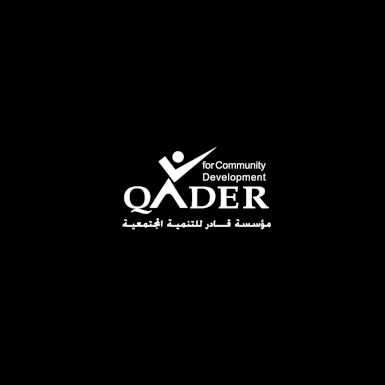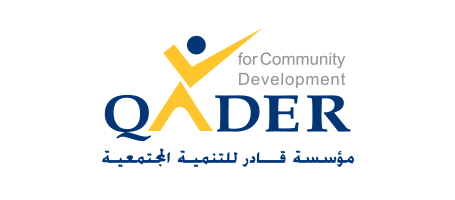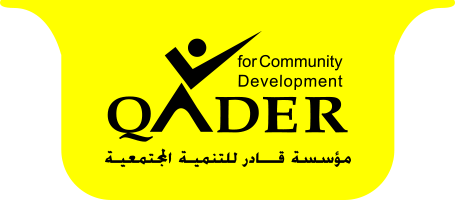Urgent Appeal: The Needs of Persons with Disabilities at the Heart of Humanitarian and Reconstruction Efforts in Gaza

QADER for Community Development (QADER) is following with deep concern the developments on the ground in the Gaza Strip following the implementation of the ceasefire agreement, after more than two years of genocide and systematic destruction that devastated residential areas, hospitals, schools, places of worship, infrastructure, and public facilities. This has left catastrophic impacts on all civilian groups—particularly persons with disabilities of all types—who continue to endure compounded and ongoing suffering under the continuing blockade, starvation policy, and collective punishment.
In light of the United Nations’ declaration on 22 August 2025 of an official famine in Gaza City, and the confirmation by the UN Independent International Commission of Inquiry (COI) in its report of 16 September 2025 that four forms of genocide have occurred in the Strip, QADER affirms that the current phase requires an urgent and comprehensive humanitarian response that considers the needs and requirements of persons with disabilities (across all types of disabilities) and places them at the heart of relief and reconstruction plans, as they are among the most affected groups during the aggression and the least able to access life-saving essential services.
Documented information presented by QADER in its comprehensive study on the impact of the Israeli aggression on the rights of persons with disabilities in Gaza—alongside numerous position papers, analyses, and international reports based on field monitoring by QADER’s Gaza team—indicates that thousands of those injured during the recent aggression have joined the ranks of persons with disabilities. Meanwhile, thousands of others have lost access to services, assistive devices, and support that had enabled them to maintain a minimum level of independence and dignity.
QADER underscores that the Convention on the Rights of Persons with Disabilities (CRPD)—particularly Articles (11), (19), and (32)—obliges all State Parties to take all necessary measures to protect persons with disabilities in situations of risk and humanitarian emergencies, ensure their right to live independently and participate fully in society, and promote international cooperation for the effective implementation of the Convention. This requires the inclusion of the needs and requirements of persons with disabilities (across all types, including multiple disabilities) in all stages of emergency relief, humanitarian response, early recovery, and reconstruction in the Gaza Strip, ensuring dignity, equality, and non-discrimination.
Urgent Humanitarian Needs of Persons with Disabilities in Gaza
QADER’s research and studies show that the aggression on Gaza since 7 October 2023 has caused near-total destruction of the health and rehabilitation infrastructure, including hospitals and specialized centers. Prosthetic limbs, wheelchairs, crutches, hearing and visual aids, medical mattresses, mobility aids, nutritional supplements, medicines, and medical consumables were damaged or lost. Supply chains for essential treatments have been disrupted, and the conditions of nutrition, health care, and psychological well-being have severely deteriorated—posing a direct threat to the right to life.
In this catastrophic situation, QADER affirms that addressing the needs of persons with disabilities must be an urgent humanitarian priority across all stages of emergency relief, humanitarian response, and reconstruction programs, through the following measures:
1. Immediate provision of medicines and treatments for persons with all types of disabilities (hearing, visual, physical, intellectual, psychosocial, and speech-related), including those with chronic diseases, in accordance with the CRPD.
2. Urgent provision of essential vaccinations for children with disabilities, and resumption of regular immunization programs for all children in Gaza—including those with multiple disabilities—as part of preventive health care.
3. Rehabilitation and reopening specialized hospitals and rehabilitation centers, and supply of prosthetic limbs and assistive devices such as wheelchairs, crutches, and hearing and visual aids, considering acute shortages that endanger lives and require immediate intervention.
4. Ensuring the access of persons with different types of disabilities to humanitarian aid and distribution points through binding accessibility standards and reasonable accommodation measures that consider gender, age, and disability.
5. Ensuring safe and accessible access to shelters and temporary accommodations for persons with disabilities, and adapting these facilities in terms of design, sanitary infrastructure, and mobility pathways—especially with the onset of winter—to preserve dignity and independence.
6. Including psychosocial support and community-based rehabilitation services within emergency programs, with special attention to women and children with disabilities across all areas of Gaza, particularly those affected by trauma and displacement, without exception.
7. Enabling organizations representing persons with disabilities to have unrestricted access to affected populations across the Gaza Strip for needs assessments, case management, and follow-up, and providing the necessary technical and logistical support to enable them to perform their roles effectively and independently.
8. Ensuring safe medical transportation and evacuation for persons with disabilities and those with severe injuries throughout Gaza, and guaranteeing unhindered entry of specialized medical teams, in accordance with the provisional measures of the International Court of Justice (ICJ) regarding the free flow of humanitarian aid and services to Gaza.
9. Allowing temporary medical evacuation for complex cases abroad, when necessary, while guaranteeing their full return after treatment—rejecting any form of forced displacement or violation of the Palestinian people’s right to return and self-determination.
10. Involving organizations of persons with disabilities (OPDs) in all stages of planning, implementation, monitoring, and review of humanitarian response, early recovery, and reconstruction, in line with the obligations set out in Article (4/3) of the CRPD and UN Security Council Resolution 2475 (2019) on the protection of persons with disabilities in conflict. This ensures their effective participation in setting priorities, decision-making, and contributing to inclusive, and rights-based reconstruction policies.
International Legal Obligations and the Free Flow of Humanitarian Aid
QADER emphasizes that the free flow of humanitarian aid to Gaza is not a privilege nor an act of goodwill—it is a binding international legal obligation for all States, UN agencies, and entities, under the decisions of the International Court of Justice (ICJ) and relevant UN Security Council resolutions.
Since 26 January 2024, the ICJ has issued three sets of provisional measures in the case brought by South Africa against Israel under the 1948 Convention on the Prevention and Punishment of the Crime of Genocide, stressing:
• The need to take all effective measures to ensure humanitarian access across the Gaza Strip, including food, medicine, potable water, fuel, and medical equipment, without barriers or restrictions.
• The need to ensure safe passage for humanitarian and medical personnel and enable them to perform their duties freely and independently.
• The obligation to lift all restrictions and blockades that impede or delay the entry of humanitarian assistance into Gaza.
Subsequent ICJ orders of 28 March and 24 May 2024 reaffirmed that non-compliance with these rulings constitutes a breach of Israel’s international legal obligations and places a collective responsibility on all other State Parties to ensure implementation and monitoring.
In addition, UN Security Council Resolutions 2712 (2023), 2720 (2023), 2728 (2024), and 2735 (2024) affirmed:
• The immediate and complete ceasefire in the Gaza Strip as a binding commitment issued by the UN’s executive authority.
• The unrestricted and continuous delivery of humanitarian aid across all parts of Gaza.
• The protection of civilians and humanitarian and medical personnel, including service providers for persons with disabilities.
• The protection of all civilian facilities, including hospitals, schools, places of worship, and UN installations.
• The facilitation of movement and mobility for humanitarian workers, ensuring full access to persons with disabilities.
Collectively, these judicial and international resolutions form a clear legal foundation obligating all States, international organizations, and UN agencies to take immediate and effective measures to ensure the free and inclusive flow of humanitarian aid to Gaza, while fully including the needs of persons with disabilities at every stage of planning, implementation, and funding—with transparency and accountable governance.
QADER also recalls that UN Security Council Resolution 2475 (2019) on the protection and promotion of the rights of persons with disabilities in armed conflict and under occupation obliges all States and UN entities to mainstream disability inclusion throughout humanitarian action, early recovery, and reconstruction, and to ensure the participation of persons with disabilities in designing and implementing programs that directly affect their lives. Neglecting these obligations constitutes a direct violation of the resolution, the principle of equality and non-discrimination, and the CRPD—particularly amid the widespread destruction in Gaza that has disproportionately affected persons with disabilities.
Therefore, disability inclusion in the humanitarian response and reconstruction of Gaza is not a voluntary choice, but a legal and moral duty grounded in international humanitarian law, the CRPD, and relevant UN standards.
Call for Implementation and Accountability for Disability Inclusion
QADER holds the international community, the United Nations, and all State Parties to the CRPD and the Convention on the Prevention and Punishment of the Crime of Genocide fully accountable for ensuring the implementation of ICJ and UN Security Council resolutions—including Resolution 2475 (2019)—as well as the obligations arising from the ceasefire agreement in Gaza, to guarantee the inclusion of persons with disabilities in humanitarian response, early recovery, and reconstruction programs.
QADER calls for urgent and effective international action to ensure:
1. Lifting all restrictions and barriers on the entry of humanitarian and medical aid, including assistive devices, medicines, nutritional supplements, and medical supplies and consumables for persons with all types of disabilities.
2. Embedding disability inclusion within early recovery and reconstruction plans across sectors such as infrastructure, education, health, housing, and public facilities, to ensure safe and full accessibility for all.
3. Allocating direct and sustainable funding to independent local organizations specializing in disability, particularly those implementing programs in Gaza, as accredited national partners for needs assessment and case management.
4. Activating international accountability mechanisms against any party that obstructs or restricts the entry of humanitarian, medical, or shelter assistance, or excludes persons with disabilities from humanitarian and relief programs across Gaza.
5. Ensuring genuine and effective participation of persons with disabilities and their representative organizations in humanitarian and development decision-making, in line with UN Security Council Resolution 2475 (2019) and the CRPD.
QADER affirms that any humanitarian or reconstruction program that fails to prioritize disability inclusion amid the compounded catastrophic conditions faced by persons with disabilities in Gaza will only reproduce exclusion, marginalization, and discrimination, constituting a blatant violation of the legal obligations of States, international bodies, and UN agencies under international humanitarian and human rights law—particularly the CRPD and related international standards.
True reconstruction begins with human dignity —no dignity can be established on exclusion.

